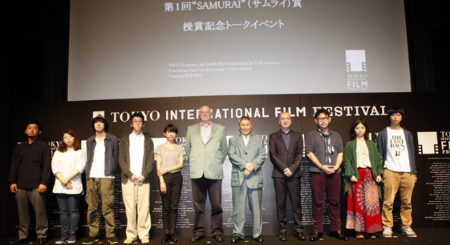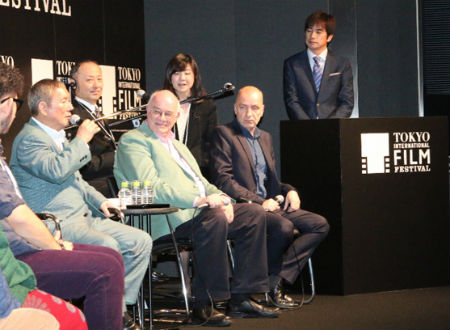

This year, TIFF launched the SAMURAI Award to commend filmmakers who continue to create groundbreaking films that carve out a path to a new era, for their achievement. Takeshi Kitano was one of the first recipients of the award. This special talk session was held in commemoration of the establishment of the award. For this occasion, several young Japanese filmmakers along with international film critics and curators were also invited to talk about the theme “Now and Future of Japanese Film.”
The talk session started with congratulating Kitano, to which he replied by stating that he was “very honored” to receive the award. Shortly after, eight young directors each had an opportunity to ask Kitano questions, and he replied in a witty manner but also whole heartedly.
When one of the young directors expressed her concern for the hardship of making a living as a director and asked Kitano if he thinks it is the responsibility of each director or the industry as a whole should develop a mechanism, Kitano offered an insightful suggestion. “I was able to utilise the experience as a film director into comedy and acting as well. So, you need to have a comprehensive view, see the benefits and weakness of the industry. Do not just contribute to the industry; expect the industry to pay back to you.”
As another young director spoke about his preference in directing, Kitano listened attentively but did not forget to remind him what he also needed to keep in his mind, “There are no regulations in entertainment and film industry. It is all about choices, you need to have your own ideas and concepts and evolve them. You should pursue what you believe as the truth, but you should not confine your mindset. If you need to focus, focus harder, and then explode, release your power. You will then have a wider perspective. Recognise that there are also other opinions.”
Photo: Takeshi Kitano talked about how he built relationships with Tony Rayns and Christian Jeune.
Toward the end, Tony Rayns and Christian Jeune, guests from overseas, also joined the session. When asked what made them interested in Kitano’s films, Rayns said he had known Kitano as an actor, but it was when he saw Violent Cop that he encountered with Kitano as a director and added that “the rest is a history.” Jeune also said that he first saw Kitano acting in Merry Christmas Mr. Lawrence, but Sonatine grabbed his attention that “it is what it remains with me after watching his movie: melancholy and nostalgia.”
Before the session closed, they were asked about the future of the Japanese films, and more specifically what those eight young directors could do to earn international reputation.
Rayns responded that although the opportunities for independent films would become more limited, he was confident that “other channels will appear, such as downloading and streaming,” and that “those other ways will be popular.” He encouraged young directors and other independent directors to pursue those new channels of distributions, and concluded, “If you make good films, people will notice. There is not much competition, you’ll be surprised.”
Jeune left a simple but compelling remark, “It is in your hands. I don’t have a key for you. You have to find your own keys. You have to find your own way to tell your story. There is no magical recipe.”
Kitano lastly said that he hopes that there will be a movie that breaks through and changes the current trends in the Japanese film industry.









